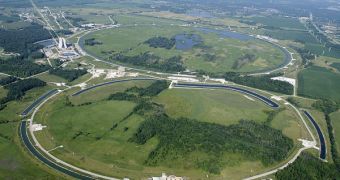At this year's annual meeting of the American Association for the Advancement of Science (AAAS) in Chicago, swords have been drawn. Through the voices of Director Pier Oddone, and colleague Dr. Dmitri Denisov, Fermilab announced that it could beat the European Organization for Nuclear Research (CERN)'s Large Hadron Collider (LHC) for the discovery of Higgs's boson, dubbed “God's Particle.” The news heated the audience, because everyone knew that the LHC was at the time undergoing repairs following an accident just one week after it was started, while Fermilab's Tevatron was already working at full capacity, colliding sub-atomic particles.
They hope to find the elusive, theoretical boson, which physicists say will allow them to understand the exact process through which particles of energy acquire mass. Of course, there is a chance that none of the accelerators could find the particle, but, if it exists, one of them undoubtedly will. And, at the moment, things look better for the Tevatron, located near Chicago, Illinois. In fact, Oddone maintained at the AAAS meeting that the worst case scenario for the American machinery would be 50-50 odds of finding the Higgs Boson.
The best case scenario, he added, would be a 96 percent chance of the Tevatron uncovering one of the most important particles in physics. It all depends on how large and heavy the boson is. If it's very, very small, then it would naturally take a lot more time and power from Fermilab to detect it. However, if it's on the large side, it could be detected fairly simple.
“We now have a very, very good chance that we will see hints of the Higgs before the LHC will. I think we have the next two years to find it, based on the start date Lyn Evans has told us. And by that time we expect to say something very strong. The probability of our discovering the Higgs is very good – 90% if it is in the high mass range. And the chances are even higher – 96% – if its mass is around 170GV. In that case, we would be talking about seeing hints of the Higgs by this summer,” Denisov added.
While the LHC will be operational again in the autumn, at best, “Tevatron is running extremely well. We are in the peak of our shape. We are increasing our data-set very quickly. And they [the LHC team] are feeling the heat. Instead of having their usual Christmas break – of two months – [Fermilab scientists] are planning to run all the way through. It's a race. Whoever is first is first,” Denisov explained.
“The Tevatron is working better than I ever imagined it could. They are accumulating data like mad. The setback with the LHC has given them an extra time window. And they certainly will make the most of it. If they do find the Higgs, good luck to them. But I think it's unlikely they will find it before the LHC comes online. They may well be in a position to get a hint of the Higgs, but I don't think they'll be in a position to discover it,” LHC project leader, professor Lyn Evan, commented while standing next to Denisov.
“And of course, if it's not in the mass range they think it is, they have no chance of discovering it at all. Pier Oddone put the odds at 50-50, but I think it's less than that. In one year, we will be competitive. After that, we will swamp them,” he concluded.

 14 DAY TRIAL //
14 DAY TRIAL //